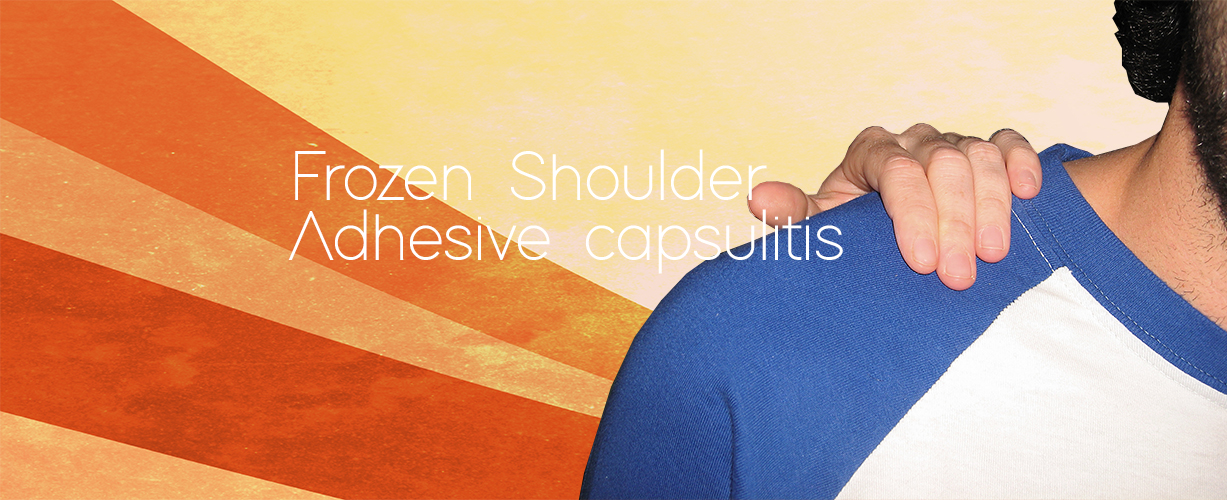Acupuncture for Frozen Shoulder Adhesive capsulitis
What is Frozen Shoulder (Adhesive capsulitis)?
Frozen Shoulder is a painful condition which effects Shoulder joint and causes a limitation of range of its active or assisted movements. In other words, pain is felt whether the movement is done by the patient or by someone else without an effort by the patient. The condition is also called “adhesive capsulitis”, “painful stiff shoulder”,
Who is affected:
It is a common health issue in general population. Females are more effected than Males. People belonging to the age group of 50s and 60s are more common sufferers.
Only a single side usually suffers, but at times may go on to involve the other shoulder as well.
Although the disease has shown to be self-limiting in a period of one to three years (longer suffering has also been reported) but the pain seriously interferes with daily life activities and Sleep.
What are Causes of Frozen shoulder?
The exact cause of frozen Shoulder is not known for sure but is generally believed to follow Inflammation of the Joint and Scar formation. The condition has frequently been associated with traumatic or surgical injury to shoulder or procedure on Heart and Brain. People with certain disease conditions are more prone to it. It does not conclude that otherwise healthy individuals will not suffer from this condition. For example, 10 to 20% of Diabetics are known to develop this condition without any of the above-mentioned causes.
What are the Symptoms of Frozen Shoulder?
Depending on changes in the symptoms, the course of disease is divided into three phases.
A disturbing stiffness and diffused to severe pain which is more pronounced at bed time, is the hallmark of the first phase lasting from 2 to 9 months.
In second phase of the disease the pain though may lessen but Stiffness and limitation of movement becomes a prominent feature, lasting for 4 to 12 months.
Over the next 5 to 24 months, is the third phase of the disease. Pain is no more in the picture and there is a regain of the range of shoulder movements though still may not be 100%. Discomfort and limitation in rotating and putting the arm behind the back may stubbornly persist.
Diagnosis of Frozen Shoulder:
Diagnosis of Frozen Shoulder is made on the clinical finding only, but to exclude any other concomitant problems, physician at times, may order imaging investigations or a diagnostic injection of anesthetic into the joint. In Frozen shoulder there is no improvement in the range of motion even with the injection.
Western Treatment for Frozen shoulder:
Physiotherapy is advised to rehabilitate the range of motion.
In accordance to the perceived cause of Frozen Shoulder, effort is directed to reduce the inflammation and control of pain by Medications like Nonsteroidal anti-inflammatory analgesics.
In cases where the disease does not respond favorably to medication and physiotherapy then surgery is attempted. The process of recovery from the effect of surgery itself needs a consideration as well.
When it comes to the Nonsteroidal anti-inflammatory drugs, one must consider their effects on the stomach lining and on the Kidneys, with a prolonged use.
Still another option remains that of injecting steroids directly into the joint space. There are two limitations to this option. One that the injected steroid usually does not end up where it is required. Second, the relief is still temporary. Similar is the fate of yet another option of Hydro dilatation of The Joint.
Traditional Chinese Medicine (TCM) view of Frozen Shoulder:
According to TCM, the Frozen Shoulder belongs to the Group of “Bi Syndrome” Diseases which appear due to Blockage in the flow of “Qi “and Blood. This blockage usually is caused by invasion of Wind, Cold and Dampness into the Channels related to the shoulder muscles. The blockage of Qi disrupts the function of the muscles and results into pain and stiffness of muscles, tendons and bones of the Joint.
Traditional Chinese medical treatment of Frozen Shoulder.
In TCM objective of treatment is to help and strengthen the body to fight back the effect of Wind attack, clear Dampness from the channel and restore the flow of Qi by removing the blockage. Once the QI and blood circulation is restored back to normality, the shoulder muscles return to their normal tone as well, therefore pain and stiffness is relived too, resulting in the restoration of the range of movement to normal level.
The treatment not only relieves the condition but also prevents its recurrence.
Acupuncture is deployed to bring about this relief as a Solo treatment or in combination with other traditional Chinese medical therapies like Cupping(Wet/Dry), Herbs or TuiNa.
Comparison of TCM and Western Medicine, in the treatment of Frozen Shoulder
Main objective of treatment the Frozen Shoulder, in Western Medicine is the symptomatic relief of pain, as real cause of the ailment is not known and understood yet. The use of NSAIDs to control pain and inflammation has inherent side effects as risk of Gastric ulceration and Renal Tubular damage among many others. Relief is temporary there is no guarantee that it will not happen again.
On the contrary, in TCM therapy the treatment is properly directed towards the elimination of the root cause of disease, under a clearer understanding of cause and effect. No matter how debate able it could be but TCM not only brings about relief of frozen Shoulder but also prevents a recurrence by Balancing the energy in the body and imparting body a strength to keep itself healthy.
How many sessions of Acupuncture are required?
The number of treatments required may vary from person to person. Generally, after a course of 6-8 sessions of Acupuncture, an appreciable relief may be obtained. If no relief is felt after six sessions, diagnosis may be reconsidered or other acupuncture points and added modalities are considered.

